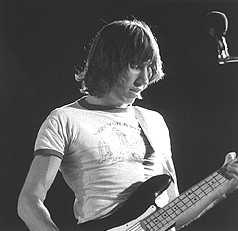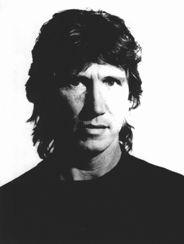


This Band is My Band
The Rise and Fall of Roger Waters
At one point, Roger Waters was Pink Floyd, for all intents and purposes. To understand how Roger Waters climbed to the top of the rock world, and why he ultimately lost his footing, we need to look at what drove him on for all those years.
Waters played a number of roles in the pre-Floyd bands. He was interested, primarily, in just being in a band--any band--as opposed to making art or promoting any particular political view in song. As such, he and his bandmates swapped instrumental duties from time to time, almost as frequently as the bands' names changed. Waters played lead guitar in Sigma 6 and the Abdabs, eventually being demoted to rhythm guitar when Bob Klose came along, and later switched to the bass with Leonard's Lodgers and ultimately The Pink Floyd Sound. "There was always this frightful fear that I could land up as the drummer," Waters quipped in 1972.
These bands (and their music) was largely inspired and influenced by American R&B, much like the Rolling Stones, the Who, the Jimi Hendrix Experience, and the Cream were. But in 1966 and '67, as the band started to become accomplished enough to warrant paying gigs and recording contracts, Waters followed Syd Barrett's songwriting lead and wrote songs that were more in line with the trippy psychedelia of the day, mixing fairy tale imagery with comic book science fiction.
As Barrett famously lost his grip on reality, Waters--along with the rest of the band--became increasingly uncomfortable with his erratic behavior. He wasn't cutting it onstage, and offstage his songwriting was degenerating as well. Granted, the abandoned single "Vegetable Man" is brilliant, and a darn sight better than anything the rest of the band had written to date--such as Richard Wright's "Paintbox" and Waters' own "Take Up Thy Stethoscope And Walk". But it was clear that Syd was on his way out, and soon the Syd-era Floyd was behind them.
It has been said before, but it bears repeating: in 1968 nobody acquainted with the London music scene believed for a moment that a Syd-less Pink Floyd would survive. Barrett was the frontman and the band's guiding light in every sense; he was the creative one, the articulate one, the beautiful, photogenic one. Contemporaries from Peter Jenner to David Bowie thought that the band would simply collapse without Syd.
Finding His Way
It was through an amazing force of sheer will that the band carried on. With Barrett gone, Waters assumed the role of frontman, announcing songs during concerts and taking a more active role in speaking for the band in interviews.
And then there was the question of material. Barrett had always encouraged the other band members to try their hands at writing, but with Syd churning out successful singles they hadn't really needed to do so. With Barrett gone, however, their hands were forced. Wright and Waters made halting attempts to duplicate Barrett's singles-oriented success with "It Would Be So Nice" and "Julia Dream", some of the worst music ever released under the Pink Floyd name.
The cuts that made up the Saucerful of Secrets album were somewhat better. The psychedelic sci-fi of Waters' "Let There Be More Light" and the silly anti-war number "Corporal Clegg" do hold up fairly well over the years, unlike Wright's "Remember a Day" and "See Saw". Give Wright credit for being true to himself, struggling to write the kind of music that he wanted to make. But it was Waters alone who showed any real promise as a songwriter.
The band's fifth single, "Point Me at the Sky", co-penned by Waters and David Gilmour, was a more interesting listen than "It Would Be So Nice", but a commercial flop nonetheless. The group decided that from that point on they wouldn't even attempt to play the singles game, and chose instead to try a very different route, with concept concerts like The Massed Gadgets of Auximenes, a slew of film soundtracks, and experimental projects designed to solidify their 'cult band' status.
It is possible that the public rejection motivated Waters to hone his craft and become a serious songwriter. He couldn't simply put some half-baked, trite confessions of love and adoration into a pop song; instead, he was going to have to search deep within himself and find something he wanted to say, something he felt passionate about. And while Gilmour and Wright (and, to an extent, Mason) continued to make valuable musical contributions, Waters developed into a serious lyric writer, unhindered by his limited talents as an instrumentalist and his rudimentary approach to melody and harmony.
On Ummagumma, Mason and Wright were recording experimental drum solos enhanced by tape effects and avant garde piano poundings, and Gilmour was trying in vain to combine three separate, under-developed musical ideas into a single work. Waters, however, was writing "Grantchester Meadows", replete with Barrettesque wordplay, assonance, and alliteration, and an evocative reminiscence of a place from his youth set to a remarkably simple acoustic guitar backing.
For the soundtrack to the documentary film The Body, Waters' compositions continued in a similar vein--he writes of the sea and the beauty of the landscape, and of "the rebirth of the Earth". He tackles themes such as the loss of innocence and the bittersweet transition from childhood to adulthood ("Your child is growing fast/His future is your past"), ideas he would touch upon again in The Dark Side of the Moon and The Wall. He also takes an early stab at lyrical activism in "Breathe", in which he laments industrial pollution.
That's not to say that the other Floyds weren't capable of writing material on their own. Gilmour's "Fat Old Sun" was as accomplished a piece of songwriting as anything else the post-Barrett Floyd did prior to Meddle, though much of its status as an early Floyd classic is due to lengthy live renditions. And it's not that the Floyds weren't capable of working together. In fact, even as Waters was coming into his own as a writer, some of the Floyd's best studio moments were the result of collaboration between all four ("One of These Days", "Echoes") or various combinations ("Fearless", "Wot's... Uh the Deal").
 |
But while Waters sometimes stumbled, writing clunkers like "Julia Dream" and forgettable filler such as "San Tropez" and "Seamus", he never stopped trying to write better and better stuff. Of the four Floyds, he was the only one who seemed really keen to make it as a serious writer, the only one who wasn't afraid to give it a shot the way Gilmour and Wright seemed to be.
A look at a typical setlist from this period shows that Waters was becoming the band's dominant lyricist: "Green is the Colour", "Embryo", "Cymbaline", "Set the Controls" were all credited to Waters alone, and it is reasonable to assume that the lyrics of "Echoes" were written by Waters as well. The remainder of the set would have been comprised of lengthy instrumentals ("Atom Heart Mother", "Careful With That Axe, Eugene", "A Saucerful of Secrets") and a select few Barrett tunes ("Astronomy Domine" and "Interstellar Overdrive"). Only Gilmour's "Fat Old Sun" made it to the setlist with any regularity.
Hitting His Stride
By late 1971, Roger Waters was ready to attempt something grander. He wrote all of the lyrics to the great Dark Side of the Moon song cycle presumably sometime between the last show of an American tour which ended in late November 1971 and the first show of a British tour which begin exactly 2 months later. And while he recycled a lyrical idea or two from earlier works (such as the line "breathe in the air") and relied heavily on the other bandmembers for musical ideas, the album's concept and lyrical meat was essentially all Waters.
Dark Side is clearly a landmark moment in the history of the recording industry, on both technical and musical levels. Pink Floyd, certainly, would never be the same. The immense success that followed must have reinforced Waters' growing notion that he was indeed a formidable songwriter, capable of moving the masses with his words.
The two albums that followed would cement Pink Floyd's place as one of the very best bands in rock music, and, by extension, Waters' place as one of the genre's great lyricists. But these albums also saw Waters taking firmer control of the band's direction. These were, after all, his songs and his message, and he became increasingly frustrated with anyone who dared to try to tell him how they should be presented. It is not entirely clear whether Gilmour and Wright took a less active role in the band at this point because they wanted to, or because they were forced to. On the one hand, they no longer had to struggle to come up with an album's worth of material, because Waters was writing plenty. But at the same time, it is easy to imagine that Waters would not have found room for any songs they might have written.
 |
To be fair, by all accounts neither Gilmour nor Wright made any attempts to write lyrics during this time. But both contributed heavily to the music of Wish You Were Here and Animals, albums with long, powerful instrumental passages. And in early 1978, both men recorded solo albums. Granted, both Gilmour's David Gilmour and Wright's Wet Dream are largely forgettable (and largely instrumental as well), but they do belie Waters' later claim that he was the only one really capable of writing anything at the time.
But whatever the reason, Gilmour, Mason, and Wright had handed Waters sole control of Pink Floyd's fate at that point. The infighting that went on during the Wall sessions is the stuff of legends--they nearly came to blows on more than one occasion, and Waters became so frustrated by Wright's perceived creative lassitude that the keyboardist was ultimately tossed out of the group entirely. The Wall was every bit as successful as the previous three albums had been, despite the fact that it lacked many of the elements that had defined the Floyd sound.
What it did feature, however, was Waters' vision. This was his project: his story, his lyrics, his concert, his film. Although Bob Ezrin and David Gilmour are credited with giving the album much of its commercial appeal, there is no question that Roger Waters was very much in control.
The Wall also found Waters' own vocals becoming more prominent than they had ever been. In the early days, Gilmour, Wright, and Waters largely sang the songs that they wrote. But while Waters was becoming the most talented songwriter, it became obvious that Gilmour was a more capable singer. By the time of Meddle and Dark Side, Gilmour was singing lead most of the time, regardless of who wrote the lyrics. But with Animals and then The Wall, Waters took over a lot more of the vocal duties, especially when they called for vitriol and venom. Again, Waters seems to have become more and more controlling of the way his ideas were presented, even in terms of how his words were delivered.
Losing His Grip
By the time Waters wrote and recorded The Final Cut, he was calling all of the shots. Gilmour didn't like a lot of the songs or the political message, but his objections were overruled by the sheer force of Waters' determination. For the first time since he had joined the band, Gilmour received no writing credits whatsoever on a Pink Floyd album. Wright had been ousted, and Gilmour and Mason were reduced to little more than session musicians, to be replaced when they couldn't play what Waters' vision called for.
For whatever reason, whether it be the record's imposing wordiness or its lack of instrumentals, the album failed to impress both the critics and the record-buying public. Waters was no doubt disappointed. After all, the public had adored The Wall--which, he thought, was essentially all him--so why shouldn't they adore The Final Cut, which was even more his work than The Wall (if that is possible)?
 |
From that point on, Waters turned his back on his former bandmates and the Pink Floyd brand name entirely. For contractual reasons, he formally resigned from the band in 1985, leaving the collective 'Pink Floyd' to die off completely. After all, he thought, the other Floyds had contributed little of artistic value in several years, and no lyrics whatsoever since 1972. Without Waters, Pink Floyd was dead.
Or so he thought. Without Waters' imposing presence dictating the band's every move, Gilmour and Mason were free to explore the possibility of doing a new Floyd record and tour--on their own terms. Whether the albums and tours that the rekindled Floyd produced are 'really Pink Floyd' is the subject of much debate among fans, even now, some 15 years after the fact. But at the time, Waters fought it with every legal ploy he and his army of lawyers could dream up. While Waters may have been the primary creative force behind Pink Floyd's greatest successes, in the end the audience decided that just as 'Pink Floyd' could live on without Syd Barrett in 1968, 'Pink Floyd' could live on without Roger Waters in 1986.
Or perhaps Steve O'Rourke's army of lawyers was just a little bit better.
Either way, Pink Floyd lives on, and so does Roger Waters. He has finally found some commercial success as a solo artist, having made a profit in tours three of the last four years. He embraces his Floydian past, and rejoices in the newfound connection he seems to have found with his fans. He even let Nick Mason perform with him at two London shows this summer. And while no one seriously believes that this will lead to a full-blown Floyd reunion (which is unlikely to be something any of them would much enjoy), it is nice to see that occasionally people can put the past behind them and just be old friends.